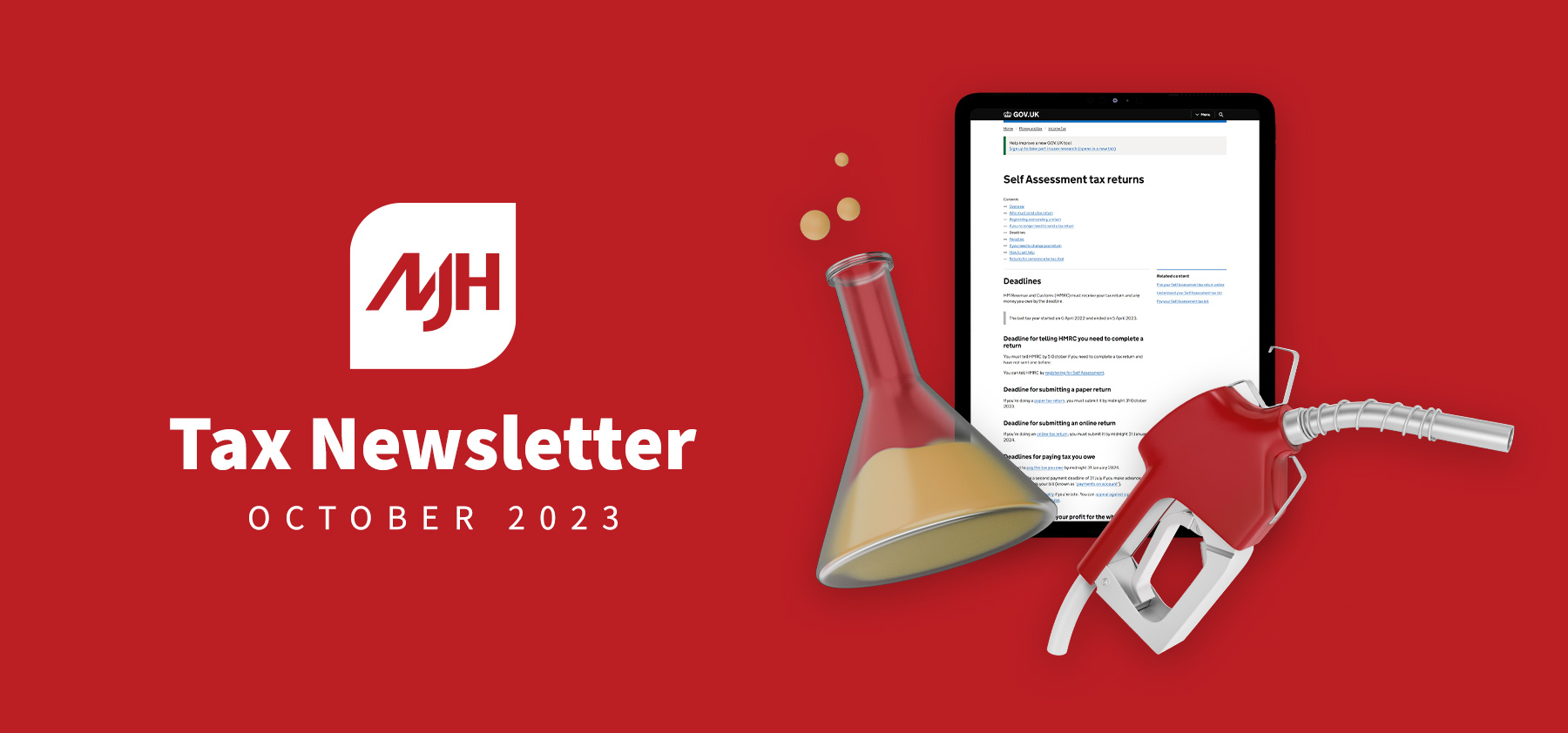
Advisory Fuel Rates – MUST Be Effective 01 October 2023

The Advisory Fuel Rates (AFRs) have had their quarterly review and HMRC published revised rates from 01 September 2023. With rising fuel prices again, it’s not surprising there were changes – mainly for cars with a higher cc. The following rates are effective 01 September 2023 but HMRC say the old rates can be used for one month from this date. So, from 01 October 2023 you must be using the following rates (with the old rates in brackets and * indicating where there’s been a change):
| Petrol (or hybrid) | Rate |
| 1400cc or less | 13p (13p) |
| 1401 to 2000cc | 16p (15p) * |
| Over 2000cc | 25p (23p) * |
| LPG | Rate |
| 1400cc or less | 10p (10p) |
| 1401 to 2000cc | 12p (12p) |
| Over 2000cc | 19p (18p) * |
| Diesel | Rate |
| 1600cc or less | 12p (12p) |
| 1601 to 2000cc | 14p (14p) |
| Over 2000cc | 19p (18p) * |
The Advisory Electricity Rate for fully-electric cars increased from 9p per mile to 10p.
There are important points worth repeating about these rates:
– They relate to mileage in company The rates for business mileage in private cars are at the (higher) Approved Mileage Allowance Payments (AMAPs)
– They are the rate of reimbursement to employees for business travel OR the rates used to calculate amounts employees should repay when they are required to make good the cost of any private travel
– Where you reimburse (or ask for repayment) at higher rates there’s a tax and National Insurance liability unless you can justify the fuel cost per mile is higher
The last point is important and if you do use rates greater than HMRC’s rates, you need to be able to demonstrate and justify why. Maybe fuel costs in your area are higher than HMRC’s UK average ones. It’s all about justifying which means more records to keep!
R&D Tax Relief – Additional Information Required

Research and Development (R&D) is a Corporation Tax relief that is a Government support to some UK companies working on innovative projects in science and technology. There are currently two R&D schemes:
– For large companies, Research and Development Expenditure Credit (RDEC) and
– For small or medium enterprises (SMEs), SME R&D tax relief
There are strict terms and conditions of eligibility and the Government has introduced measures to tackle what it perceives as abuse of this support package and non-compliance. At the same time, though, they have updated what counts as qualifying expenditure, including 21st century realities such as costs for data licences and cloud computing.
For NEW R&D relief claims for accounting periods starting on or after 01 April 2023, from 08 August 2023 the following changes are in place:
– New claims must be made digitally accompanied by a compulsory additional information form
– Notifications must be made in advance of any R&D claim being made on a Corporation Tax return, and
– The notification and additional information form must contain details of any agent involved with making the R&D claim
Note that not all companies involved in innovation will be entitled to claim R&D tax relief. An accountant will be able to advise on an effective and achievable business plan for your company and help make a grant application – or advise if an application will be turned down.
Register for Self-Assessment – The Deadline Approaches

The deadline for registering for Self-Assessment is 05 October 2023 (for 2022/23 tax year with tax returns due by 31 January 2024). Individuals must complete and send a tax return if, in 2022/23:
– You had self-employed income above £1,000, or
– You are a partner in a business partnership, or
– You were liable to pay the High Income Child Benefit Charge, or
– You had taxable income over £100,000
There are also other situations where you may have to complete a tax return such as receiving foreign income or income from savings, investments and dividends. You are advised to use the ‘Check if you need to send a Self-Assessment tax return‘ tool on Gov.UK.
HMRC have announced the income over £100,000 threshold will increase to £150,000 for the tax year 2023/24. This may mean less people need to file a tax return for 2023/24 (though you will for 2022/33). However, you should be aware that once registered for Self-Assessment you remain liable to complete a tax return. If you do not, HMRC will issue late filing penalties and could create an estimated tax liability which you are required to pay.
Registering (online) is far easier than deregistering (online form using a Government Gateway login, telephone or HMRC’s chat facility)!
Statutory Paternity Leave and Pay Changes in 2024

These affect us personally and professionally and if you have policies and procedures regarding Statutory Paternity Leave (SPL) and Pay (SPP), be aware of changes coming from the start of the 2024/25 tax year. This information is provided to help you prepare.
The Government committed to making it easier for fathers to take leave (and pay) as follows:
– The 2 weeks can be taken in non-consecutive blocks of one week (compared to the fixed regime now)
– Instead of having to take the 2 weeks within 56 days of the birth / placement of a child, this is extended to 52 weeks
– The employee will have to provide a ‘Notification of entitlement‘ 15 weeks before the birth / placement AND
– A leave request form 28 days before the required leave dates
There is NOT a change to the eligibility and rate of payment / reclaim criteria just the current rules will be more flexible. Legislation will be introduced so the changes are effective 06 April 2024 and in place by 08 March 2024 (28 days before 06 April 2024).
A small change but a major one for employers. So, we have prepared a simple action checklist below:
| Item | Why? | Check (Y / N / N/A) |
| Policies and procedures | There are changes to the length of time over which leave (and pay) can be taken, how it can be taken and notifications the employee must give. | |
| Software | Payroll and HR software must allow the flexibility from 06 April 2024. If you use HMRC’s Basic PAYE Tools, they have advised this will be updated. | |
| Gov.UK forms | The forms will change and you need to have these in your possession (the SC3, SC4, SC5, SPP1 and SPP2). | |
| Internal forms | The above are not mandatory and you may have your own versions to update. Remember, there is the notification of entitlement AND the notification of leave start date. | |
| Online guidance | HMRC produce a range of calculators, eligibility checker and guidance. They assure these will be updated in time for the reforms. Make sure you are referring to the correct and updated guidance. | |
| Communicate! | This is a reform of an existing entitlement. But people need to know! |
October Questions and Answers

Q: We have started reimbursing London’s extended Ultra Low Emission Zone charges when an employee must pay them whilst on business for us. Can we reimburse them free of tax?
A: Yes, the reimbursement can be made free of tax (and National Insurance). Think that this is a cost the employee has had to incur as a result of doing their job. So, really, it’s treated the same way as any other motoring cost you may reimburse such as the cost of parking or a toll road. You are very much advised to make sure all expenses reimbursed are receipted just in case HMRC checks in future!
Q: Our accountant has asked we complete a paper 64-8 authorising them to act as their agent for the Construction Industry Scheme. Can they include a scanned picture of my signature on the form or do I have to physically sign it?
A: If it’s on paper, you need to sign the form. HMRC call this a ‘wet’ signature as opposed to a digital one that could be used if you completed the form online. Maybe ask if they have an online service account so you can complete the 64-8 online and use your digital signature. In this digital world, it is, perhaps, surprising that there are only 3 online forms where you can use the digital signature – the 64-8, the P87 (for expenses) and the Marriage Allowance claim form.
Q: We are considering outsourcing our accounts and payroll function, even though they have worked OK in-house ever since we set the business up. We are a small employer with about 30 staff. Can you give me a few key pointers so I can prepare a business case for this?
A: There are many reasons why an employer might want to outsource some or all their services and different employers will benefit in different ways. However, there are some common advantages that can be a benefit to all businesses and here are some points you might want to expand on:
– Outsourcing allows the employer to work ON their business rather than IN it
– When the employer works ON their business and outsources some work IN the business, you get support in a variety of ways – business planning, advice on restructuring, training, business filings like RTI etc
– An agent / accountant will have access to a range of up-to-date tools, resources, technology and software that you won’t. These are all essential for compliance in a world that is increasingly complicated
– Outsourcing doesn’t mean you are divorcing yourselves of responsibility altogether but outsourcing mean you will get provided with a broader range of tools and expertise than you would have in-house, especially true of a smaller company
– An agent / accountant will have access to the most up-to-date legislation that affects processing (and will avoid non-compliance and penalties)
October Key tax dates

1st
– HMRC’s Advisory Fuel Rates (published in September) must be implemented by employers by the date
5th
– The deadline for individuals, trusts and partnerships to notify HMRC of the need to register for Self-Assessment (2022/23 tax year)
15th
– If a US expatriate had a 2022 federal tax return extension agreed, 15 October 2023 is the deadline for filing. Note that 15 October 2023 is a Sunday and the due date is delayed until the next business day (the 16th)
19th
– Deadline for sending the Employer Payment Summary (EPS) for tax month ending 05 October 2023
– Deadline for paying HMRC all PAYE, NICs, Student Loans and CIS deductions (less child-related statutory payments) if paying by a non-electronic method
22nd
– Deadline for paying HMRC all PAYE, NICs, Student Loans and CIS deductions (less child-related statutory payments) if paying electronically. 22 October 2023 is a Sunday and HMRC must have cleared funds on or before this date so ensure you submit by Friday the 20th
31st
– The filing deadline for paper Self-Assessment tax returns (individuals, trusts and partnerships
 Book a No-obligation Discovery Call
Book a No-obligation Discovery Call




 Book a Free Discovery Call
Book a Free Discovery Call

